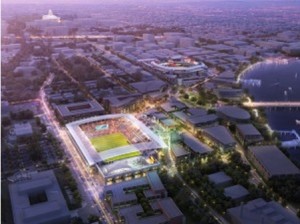The deal to bring a new soccer stadium for DC United appears to be making progress, with the proposal to swap the Reeves Center for stadium land likely to be taken out. The land swap has been contentious because it lacked transparency and was recently assessed by independent consultants to be a bad financial deal for DC. Instead of a land swap, the District is likely to borrow funds to buy stadium land.
But there are a number of other very important issues that remain unresolved, including risks that DC’s costs could rise substantially, large tax breaks for DC that are not warranted, and the lack of community benefits. These are important because every dollar borrowed to buy stadium land is a dollar that could otherwise go to build something else — a school or a replacement for the DC General shelter, for example. In addition, every dollar in tax breaks for DC United is a dollar not going into the city’s coffers that could be used for education, public safety, health care, or other services.
Here are issues the DC Council should consider as it moves the deal forward. 
- Set a clear cap on DC’s contribution, and ensure DC United will meet their obligations: Final legislation should set a firm cap on how much the city will provide for land, environmental remediation, and infrastructure — and clarify that DC United will pick up all necessary costs above the cap, including future stadium repairs. It is projected that DC’s costs would be around $130 million, and this could be set in law as an ironclad cap.
- Consider other sites that are DC-owned: The District wouldn’t need to borrow as much for the stadium if it used land it already owns.
- No tax abatements: The deal currently includes tax breaks worth $50 million or more. Yet most stadium deals do not include tax breaks for the team, and DC’s Chief Financial Officer finds that the proposed sales and property tax breaks for DC United are not needed for the deal to go through. With tax breaks, DC’s share of stadium costs would be over 60 percent, not a fair split.
- Eliminate other risks: The legislation should require DC United to line up financing and make firm commitments to build the stadium before the city starts its process to buy land.
- Community benefits: Most large developments include new benefits to help the surrounding community that is most affected by development. The best way to do that is to mandate in legislation that the stadium include a binding community benefit agreement that includes the city, DC United, and a community representative.
Getting a new stadium for DC United is a good thing, but it is important to get it right rather than to rush it and get it wrong.
To print a copy of today’s blog, click here.
